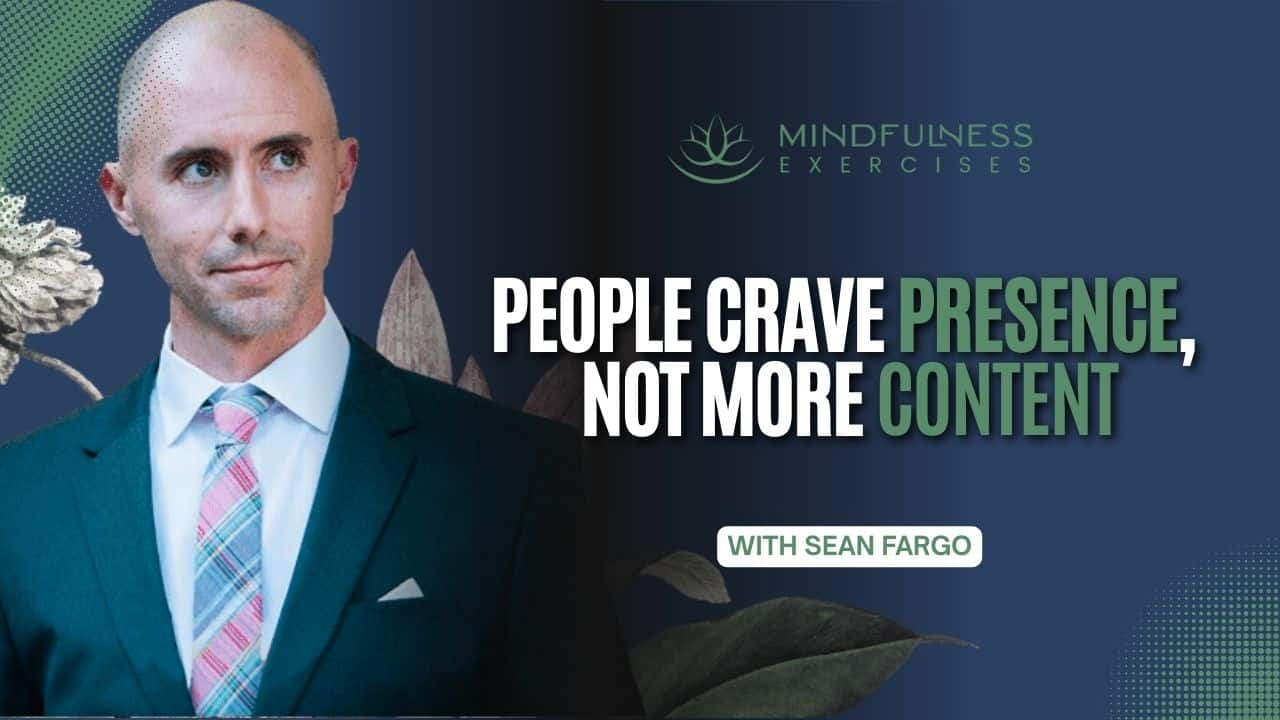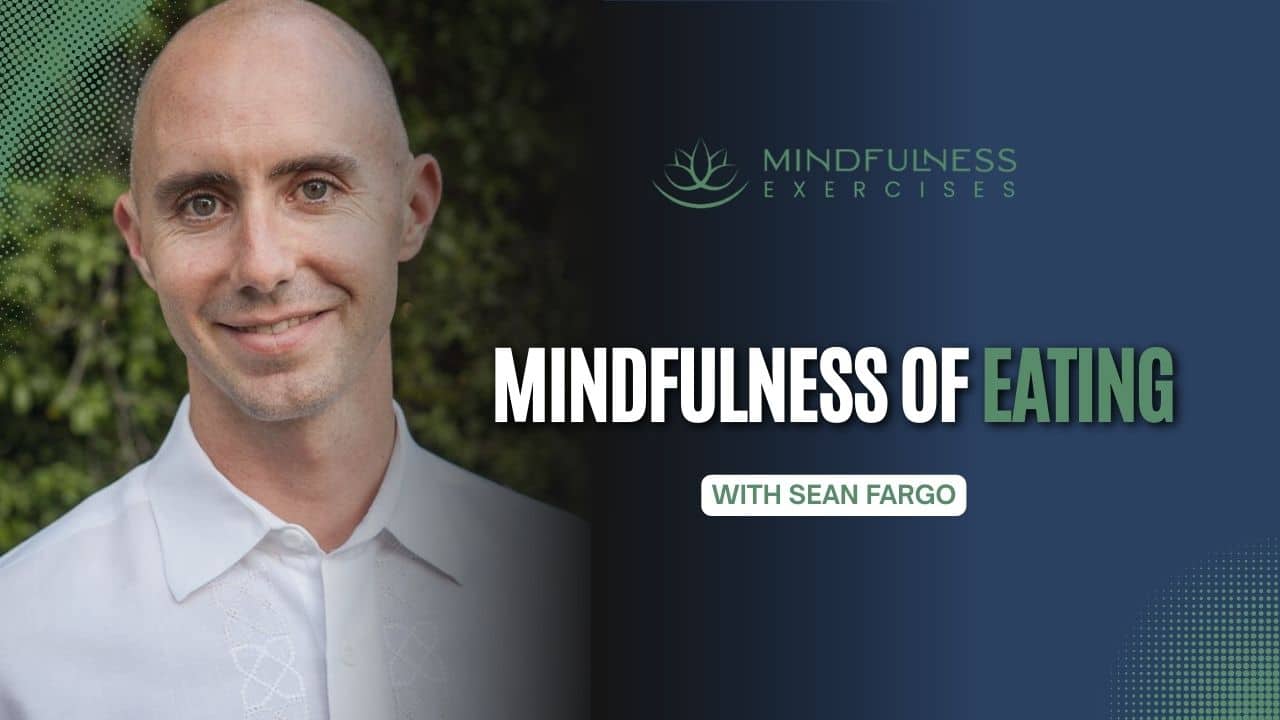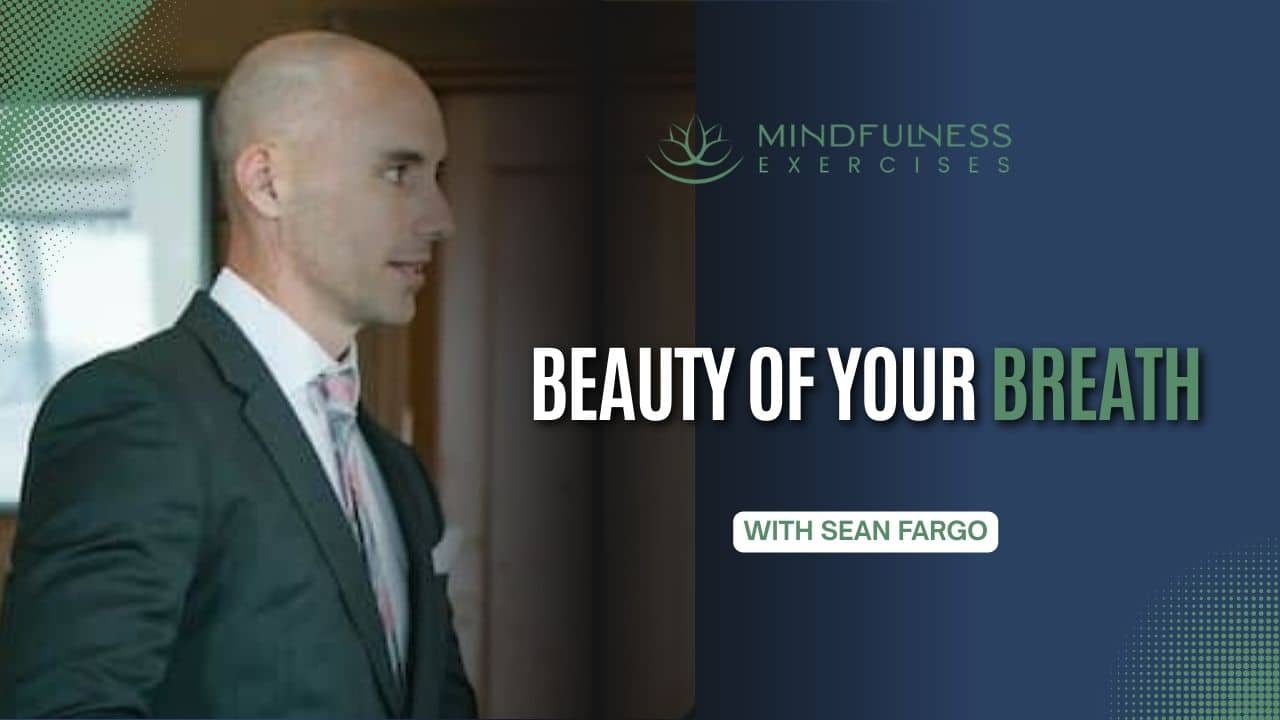As mindfulness teachers, coaches, and wellness practitioners, most of us didn’t step onto this path because we love contracts, entities, or the phrase “commercial tort costs.”
We’re here because we care deeply about easing suffering, offering presence, and supporting transformation.But here’s the hard truth Heather shares in this workshop: once you start charging for your work, you are running a business—with all the legal responsibilities that come with it, whether you see yourself as “just a solo teacher” or not.
The good news? You don’t need a law degree to protect yourself. You just need a simple map.
In this in-depth training, Mindfulness Exercises founder Sean Fargo sits down with Heather Pearce Campbell, attorney and legal coach for mission-driven entrepreneurs, to walk through a practical, five-bucket legal framework designed specifically for businesses like yours.
Sponsored by our Mindfulness Meditation Teacher Certification Program
certify.mindfulnessexercises.com
Episode Summary
In this 2‑hour workshop, attorney and legal coach Heather Pearce Campbell walks mindfulness teachers, coaches, and wellness practitioners through a clear, human, and surprisingly compassionate legal roadmap.
She explains why small online businesses can’t “hide” from legal risk, how to think about business entities, contracts, insurance, intellectual property, and dispute resolution, and how all of this applies specifically to mindfulness teaching online and in-person.
In This Episode, You’ll Learn:
- Why heart-centered entrepreneurs often minimize their legal risk—and why that’s dangerous.
- The “wild west” reality of doing business on the internet, and how to stop flying blind.
- What it really means to “separate business liability from your personal assets” (and why an LLC or corporation matters)
- How to use contracts as containers, not fences—supporting clarity, trust, and healthy boundaries with clients and collaborators.
- Why 99.9% of US businesses are small businesses and what that means for you as a mindfulness entrepreneur.
- The five core legal “buckets” every mindfulness teacher with a business should know.
- Simple steps to protect your curriculum, scripts, courses, workshops, and brand as intellectual property.
- How to approach difficult client conversations and legal conflict with more skill and less reactivity—drawing on the book Difficult Conversations.
Highlights:
| Timestamp | Section Title | Summary |
|---|---|---|
| 0:00–5:00 | Welcome & Introductions | Sean introduces Heather, explaining her role supporting Mindfulness Exercises with entity formation, terms & disclaimers, and why he trusts her with legal strategy. |
| 5:00–15:00 | Heather’s Story & Mission | Heather shares her journey launching a practice straight out of law school, the loss of her mother, and her commitment to serving mission-driven entrepreneurs. |
| 15:00–25:00 | Entrepreneurship, Risk & Legal Myths | Discussion of why entrepreneurs avoid legal support, common myths, and the real stakes involved in not having proper legal foundations. |
| 25:00–40:00 | Legal Landscape for Small & Online Businesses | Overview of how small businesses face legal challenges disproportionately, including lawsuits and compliance costs, despite being the backbone of the economy. |
| 40:00–1:05:00 | Bucket 1: Business Structure | Sole proprietorship vs LLC vs corporation, risks of leaving personal assets exposed, and legal and psychological benefits of formalizing a business entity. |
| 1:05:00–1:30:00 | Bucket 2: Business Contracts | Client agreements, online program terms, website T&Cs, privacy policies, NDAs, and why contracts protect both business owners and clients. |
| 1:30:00–1:40:00 | Bucket 3: Business Insurance | Covers general liability, professional liability (E&O/malpractice), event coverage, and when umbrella policies are appropriate. |
| 1:40:00–1:52:00 | Bucket 4: Intellectual Property (IP) | Heather explains trademarks, copyrights, trade secrets with a “mountain” metaphor and shares ways to protect curriculum and content. |
| 1:52:00–End | Bucket 5: Dispute Resolution & Difficult Conversations | Guidance on anticipating conflicts, designing communication pathways, and using tools like Difficult Conversations to handle issues effectively. |
Why Legal Protection Matters for Mindfulness Teachers
If you guide meditations, teach mindfulness in organizations, run retreats, or offer online courses, you’re doing more than sharing practices—you’re:
- Making claims (even gentle ones) about benefits and outcomes
- Collecting personal data, sometimes health-related
- Facilitating emotional and psychological processes
- Running transactions online across cities, states, or even countries
That means you’re operating inside a web of regulations and risks that weren’t designed just for people in suits. They apply to solo mindfulness teachers as much as to large coaching companies.
A few realities Heather points out:
- In the US, small businesses make up roughly 99.9% of all firms, and they shoulder a large share of litigation costs.
- Legal events for small businesses—like contract disputes, refund fights, IP issues, or regulatory actions—can cost anywhere from a few thousand dollars up to six figures.
For many independent mindfulness teachers, a single serious dispute could wipe out years of savings—or even force you to close your doors.
So, the question Heather invites us to ask is not “Can I afford legal support?” but:
“Given what I’m building, what can I afford to lose?”
That’s a very different—and much more grounded—question.
The 5-Bucket Legal Framework (Mindfulness-Friendly Version)
Heather’s gift in this workshop is taking something that feels amorphous (“legal stuff”) and turning it into a simple, repeatable framework:
Five buckets. That’s it.Every legal need in your mindfulness business lives in one (or more) of these.
We’ll walk through them here with a lens specifically for mindfulness, meditation, and wellness professionals.
Bucket 1: Business Structure – The Foundation
Core question:Is your business properly separated from your personal life?
Most mindfulness teachers start as sole proprietors—doing business under their own name without a separate legal entity.
It feels simple… until something goes wrong.
As a sole proprietor:
- Your personal bank accounts, car, and possibly your home may be exposed to business liability.
- There’s no formal line between “me” and “my business.”
Heather emphasizes that forming a separate entity—most commonly an LLC (Limited Liability Company) in the US—is the primary way to separate business liability from your personal assets.
For many small, heart-centered businesses, an LLC offers:
- Limited liability (when maintained correctly)
- Flexible management (compared to a full C‑corporation)
- Potential tax advantages, especially if you later elect S‑corp status (in consultation with a CPA)
Outside the US, the specific entity might be different (for example, corporations, limited companies, or other local forms), but the principle is the same:
Create a container so your business can take the hits, not your entire personal life.
For mindfulness teachers, this is especially relevant if:
- You own a home or significant assets
- You run retreats or in-person events
- You work with vulnerable populations (trauma, mental health, medical settings)
- You’re growing beyond “tiny side project” into a sustainable livelihood
Bucket 2: Business Contracts – Containers for Your Relationships
Core question: Is every exchange of value in my business clearly documented?
Heather defines contracts not as fences but as containers. They hold and protect the relationship between you and the other party—client, collaborator, or contractor.
If you’re a mindfulness teacher, consider these key places where contracts matter:
1. Client Agreements
For 1:1 coaching, therapy-adjacent work, or consulting, you’ll typically want:
- Scope of work (what’s included and what’s not)
- Payment terms and refund policy
- Cancellation and rescheduling
- Confidentiality and how you store data
- Clear disclaimers (e.g., “This is educational, not therapy or medical care”)
- Limitation of liability
2. Group Programs & Online Courses
If you run:
- Mindfulness group programs
- Membership communities
- Self-paced courses
- Teacher-training cohorts
you’ll want Terms of Purchase or Program Terms that cover:
- Access length & usage rights
- Community guidelines and behavior policies
- IP protections (they can’t reuse your content as their own)
- Refunds, guarantees, or “no-refund” language
- Assumption of risk & disclaimers
Heather notes that 60% of small-business lawsuits are contract-based, often due to fuzzy expectations, missing terms, or poorly written agreements.
Good contracts reduce that risk dramatically—and protect your nervous system in the process.
3. Website Terms & Privacy Policy
If you have a website (which you probably do if you’re reading this):
- Website Terms & Conditions set ground rules for visitors, limit your liability for free content, and help clarify IP ownership.
- A Privacy Policy is legally required in many jurisdictions whenever you collect personal data—think email addresses, names, contact forms, or tracking data.Legal Website Warrior+1
This is especially important if you’re building a list for your teaching, retreats, or online programs.
4. Collaborators, Assistants & Contractors
Think about:
- Virtual assistants
- Co-teachers
- Guest experts
- Designers, web developers, marketing agencies
All of these relationships benefit from written agreements that address:
- Deliverables and deadlines
- Payment structure
- IP ownership (who owns what is created)
- Confidentiality and non-disclosure
Bucket 3: Business Insurance – A Cushion Around the Whole System
Core question: If something big goes wrong, do I have a financial buffer?
Insurance is not the first step, but it is an important layer.
Heather encourages entrepreneurs to speak with a business insurance broker who understands small businesses and online services.
For mindfulness and wellness professionals, you might explore:
- General liability insuranceCovers things like physical injury or property damage (e.g., someone slips at your retreat venue).
- Professional liability / Errors & Omissions (E&O)Sometimes called malpractice insurance; can help if someone claims your professional advice or services caused them harm.
- Event coverageFor retreats, workshops, or large live events.
- Umbrella policiesAdditional coverage that sits on top of your existing policies if you have significant assets.
The right mix depends on your specific work. But if you’re running in-person retreats, doing deep psychological work, or working in corporate/healthcare environments, this bucket deserves attention.
Bucket 4: Intellectual Property – Protecting Your Curriculum & Content
Core question: How am I protecting what I create?
If you:
- Write meditation scripts
- Design curriculums
- Publish articles, worksheets, or e‑books
- Produce audio/video content
- Create frameworks, models, or unique sequences
you are constantly producing intellectual property (IP).
Heather shares a simple metaphor:
Your business is like a mountain.
- The snowy peak is your brand—protectable by trademarks.
- The body of the mountain is your content—protectable by copyright.
Trademarks – The Snowy Peaks
Trademarks protect:
- Business names
- Logos
- Short, distinctive phrases (taglines, program names)
For example, a unique name for your mindfulness teacher training or your signature 8‑week course may be a good candidate for trademark registration if you plan to scale and strongly brand that offering.
You can use:
- TM when you’re claiming a mark but haven’t registered it yet
- ® only once you’ve successfully registered the mark with the relevant authority (like the USPTO in the US)
Because trademark law can be nuanced, Heather generally recommends getting professional help before filing.
Copyright – The Body of the Mountain
Copyright protects the expression of your ideas, not the idea itself. That includes:
- Meditation scripts
- Written curriculums
- Articles and blog posts
- Videos and audio recordings
- Worksheets, workbooks, and slide decks
You automatically own copyright in your original work as soon as you create it in tangible form. But registering key works (like a flagship curriculum or comprehensive course) can give you stronger tools if someone copies you.
Adding a simple copyright notice is a practical habit, for example:
© 2025 [Your Name or Company]. All rights reserved.
On your slides, PDFs, and program materials, this signals ownership and can support enforcement later.
Trade Secrets – The Hidden Recipes
Some things you won’t want to publish or register at all, such as:
- Internal processes
- Proprietary frameworks
- Unique sequences or assessments
These are treated as trade secrets, and they’re mainly protected through contracts:
- Non-disclosure agreements (NDAs)
- Confidentiality clauses in employment/contractor agreements
- Tight internal access to key materials
Again, the IP bucket loops back into the Contracts bucket—these buckets talk to each other.
Bucket 5: Dispute Resolution – A Mindful Approach to Conflict
Core question:What’s my plan for when something goes wrong?
Even with clear contracts and heartfelt intentions, you will eventually encounter:
- A difficult client
- A refund dispute
- A chargeback
- A miscommunication about expectations
Heather calls this bucket “dispute resolution strategy,” but you might think of it as your communication and conflict-playbook.
There are two layers here:
1. Contractual Dispute Clauses
Well-drafted agreements often include:
- A requirement to try good-faith discussion first
- Mediation as a first formal step
- Arbitration (private, often faster than court) as a next step if needed
This keeps many conflicts out of the public court system and can reduce costs—financial and emotional.
2. Human Communication Skills
Heather strongly recommends the book Difficult Conversations: How to Discuss What Matters Most (by Douglas Stone, Bruce Patton, and Sheila Heen), a classic from the Harvard Negotiation Project that offers a step-by-step approach to tough conversations.
For mindfulness teachers, this lands close to home. Many of us already care deeply about:
- Staying present in discomfort
- Holding others’ emotions with compassion
- Owning impact, not just intention
Bringing those skills into our business conversations—especially when tensions run high—can turn potential legal crises into repair, learning, and sometimes even stronger relationships.
Heather encourages building internal systems around this:
- How your team responds to “red flag” emails
- When issues get escalated to you
- How you track and resolve complaints
Combined with the right disclaimers and boundaries, this bucket can save you enormous stress over tim
Applying the 5 Buckets to Your Mindfulness Business
Let’s connect this framework directly to real-life situations you might face as a mindfulness teacher or coach.
Example 1: Launching an 8-Week Online Mindfulness Course
- Structure: You run the course under your LLC instead of your personal name.
- Contracts:
- Clear sales page and checkout Terms of Purchase
- Refund policy spelled out (e.g., “no refunds after week 2”)
- Disclaimers that the course is educational, not therapy or medical advice
- Insurance: You explore professional liability coverage if you’re working with people experiencing anxiety, depression, or trauma.
- IP:
- Copyright notice on your slides, workbooks, and recordings
- You consider registering the course as a collection of materials if it becomes a significant asset
- Dispute Resolution:
- Terms include mediation/arbitration
- You create internal guidelines for how you’ll respond if a participant becomes distressed or demands a refund
Example 2: Running a Mindfulness Retreat
- Structure:The retreat is run under your entity (LLC/corp), not just “you personally.”
- Contracts:
- Retreat participant agreement
- Venue contract
- Waivers and assumptions of risk
- Insurance: Likely includes event coverage plus your usual general/professional liability.
- IP: Your retreat handbook and supporting materials are clearly marked as your original work.
- Dispute Resolution: Clear policies around cancellations, emergencies, and behavioral expectations.
Example 3: Creating a Mindfulness Teacher Training
This is where Mindfulness Exercises lives as well—offering a CPD and IMMA-accredited Mindfulness Meditation Teacher Certification Program for those who wish to teach mindfulness professionally.
Here, all five buckets become even more important:
- A solid entity
- Robust contracts and terms
- Thoughtful insurance
- Strong IP strategy for curriculum, scripts, and brand
- Clear dispute pathways and communication systems
Speaker Bio: Heather Pearce Campbell, JD
Heather Pearce Campbell is an attorney and legal coach based in Seattle, Washington. She is the founder of Pearce Law PLLC and the creator of The Legal Website Warrior®, an online business that provides brand protection, legal education, and support to information entrepreneurs—coaches, consultants, online educators, speakers, authors, and other experts—around the world.
Heather describes herself as a warrior mama, nature lover, and lifelong information hoarder who secretly dreams of minimalism. She is the host of the Guts, Grit & Great Business™ podcast and offers resources ranging from DIY legal templates to comprehensive legal strategy programs for small and scaling businesses.
Next Steps: Putting This Into Practice
After watching Heather’s workshop and reading these notes, here’s a simple, compassionate way to move forward—without overwhelm:
- Choose one bucket to focus on this month.For many, that’s either Business Structure (forming an LLC or local equivalent) or Business Contracts (updating your client agreements and website terms).
- Make a short list of your top 3 legal priorities.For example:
- Register an LLC
- Update website terms & privacy policy
- Add a clear disclaimer to my sales pages
- Book one conversation:
- With a small-business attorney who understands online service businesses, and/or
- With your CPA about entity and tax questions, and/or
- With your insurance broker about coverage.
- Keep learning in small bites.Consider Heather’s Legal Basics Bootcamp for bite-sized legal education, and use this workshop as a reference whenever your business model evolves.
- Remember why you’re doing this.Legal protection isn’t about becoming rigid or fearful. It’s about creating a safe container—for you, for your clients, and for the work you’re here to share.
Your mindfulness practice has already given you the tools to meet discomfort with presence and courage. Bringing that same presence to the legal side of your business is just another expression of care.



